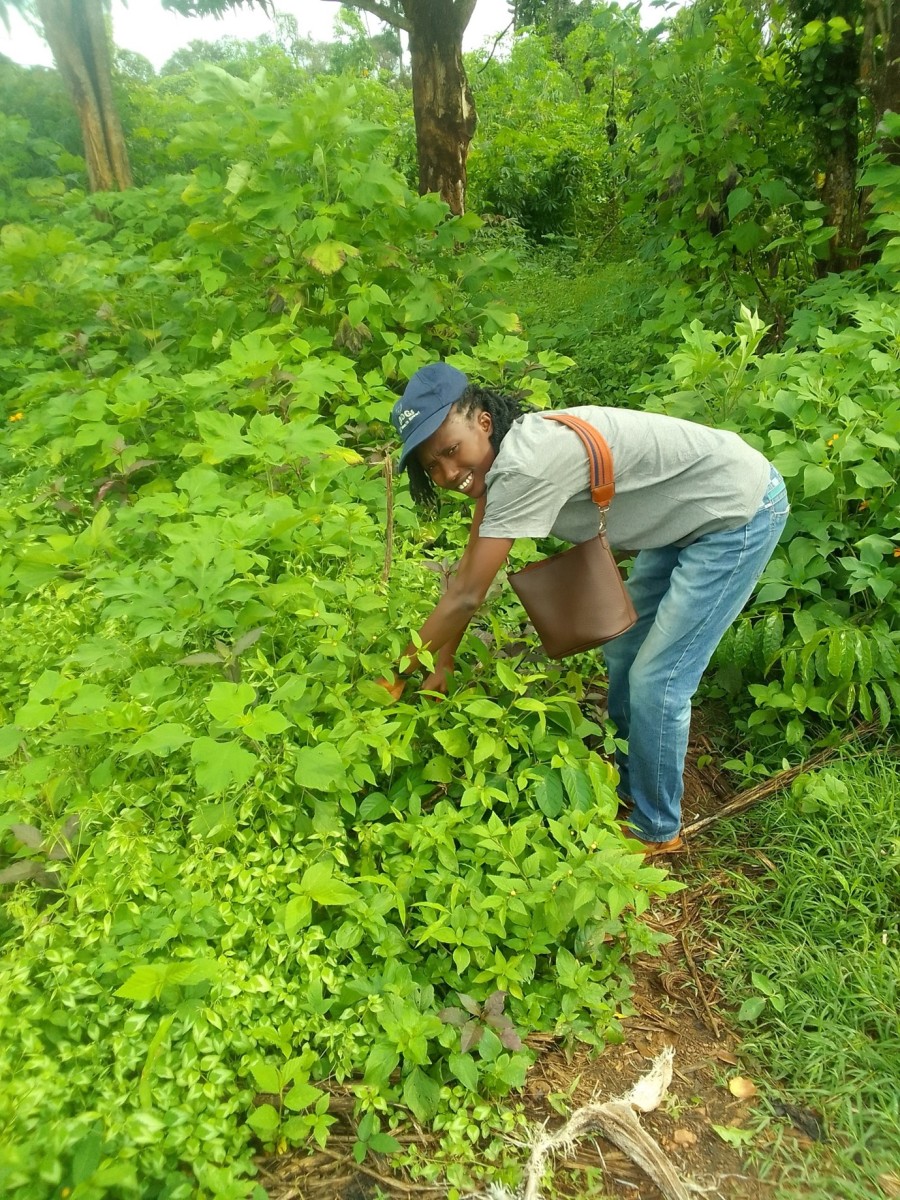For Black History Month, the British Ecological Society (BES) journals are celebrating the work of Black ecologists from around the world and sharing their stories. The theme for UK Black History Month this year is Time for Change: Action Not Words. Damilola Olanipon—an early career researcher at Afe Babalola University, Nigeria—shares her story below.
I was brought up by a single mother and, gaining admission to University at the young age of 15 to study Botany, I was in a world of my own. Initially, my desire was to study medicine—I put in my best effort to get good grades in my first year so that I would be able to cross into medical school but this path was not right for me. During my second year, I tried for another joint admission matriculation examination and still I could not gain admission to study Medicine. Following this, I made up my mind to put my best in studying Botany—after all whatever is worth doing at all is worth doing well, and it was my time to take action.
As a young undergraduate student of Obafemi Awolowo University, Nigeria, my hard work paid off with several scholarships thanks to the Carnegie Corporation and Ekiti State Government—this greatly encouraged me to keep on. Thus, my career in ecology and plant science began. I went on field trips to natural forest, and was intrigued by the clean air, favourable climate, serene environment, and the variety of life forms and biodiversity (flora and fauna) observed in an undisturbed state. Following this, my keen interest in forest science was triggered! My young mind had questions such as: what practices support the stability observed?; How are the plants and animals protected from encroachers and marauders?; How can such a favourable climate and serene environment be replicated in our cities in spite of several sources of pollution?
My postgraduate studies on urban forestry and ecophysiology focussed on the ability of tree species to sequester toxic gases and pollutants (sulphur dioxide, carbon monoxide, nitrous oxides, and heavy metals) from the environment to support a habitable environment. While carrying out this research, I usually go to the field on biweekly visits to collect leaf samples of trees which I later bring to the laboratory to analyse their physiological and biochemical parameters. Through this, I was able to understand very clearly how tree species carry out the function of air filtering in cities to reduce the concentration of greenhouse gases.
As an early career researcher with challenges in research funding, personal funding of research has, unfortunately, been a usual practice. My current research involves an investigation into carbon storage and productivity of natural forest, with a focus on the ecosystem functions they provide. I am also interested in understanding the genetic diversity of tree species and root-associated fungi, while exploring areas such as Bioinformatics, DNA metabarcoding, and even application of biotechnological tools in micropropagation and conservation of endangered and threatened tree species.

In order to build my research profile and expand my knowledge, I have joined several professional bodies such as the Network of Nigerian Women in STEM (NWiSTEM), PlantGene Community, North American Plant Phenotyping Network (NAPPN), Organization for Women in Science for the Developing World (OWSD), British Ecological Society(BES), International Humic Substance Society (IHSS) and Author Aid Journal Club. I have benefitted immensely from the training, seminars, courses, and workshops facilitated by these organizations, both virtually and in-person. I have learned about research writing, how to write grant applications, journal critiquing, and mentorship. Now, I look forward to opportunities to learn analytical data and programming skills like R, Python, and application of computational models in ecological research.

I have had my share of successes, disappointments, failures, high times and low times. In this journey, I have faced a lot of hurdles as a female researcher in a developing country due to high article publication charges, journal rejections, and unsuccessful applications for jobs and further studies. I made up my mind a long time ago that it is not enough to just accept a negative outcome—you must take a step forward and keep trying because with determination you can make it. I believe that to achieve success you cannot stop trying, you just have keep on. Now that I have a lecturing position in a Private University, I have mentored and supervised undergraduate students to completion and I am more open to opportunities for research collaborations. My most recent achievement is the Coimbra Scholarship for Young Researchers in Sub-Saharan Africa—this is a great feat for me, and I hope to make the most judicious use of it. The scholarship will enable me to carry out research on the topic “Phylogenetic Diversity and Structure of Root-Associated Fungi in a Tropical Forest of Southwest Nigeria”.

My aspiration and dream is to become a Professor of Plant Ecology and a mentor to my students. I am a young African lady with a zeal for knowledge and scholarly development. I strongly desire to make a lasting impact through my research, positioning myself so that I will be able to effectively use my ideas, talents, experiences and passions to bring a positive change to Africa and the world at large. My 5-year goal is to have a research group of my own as a principal investigator, as well as a well-equipped laboratory for the training of postgraduate and undergraduate students. I also desire to have won at least 2 research grants to fund research so that my group can be continually active.

To end up my story for the UK Black History Month, my appreciation goes to all those who have helped me in my career. I have a lot of mentors and family members who have supported me, lifted me with words, and encouraged me even when the low moments came. I say thank you to all. Enough words said, this just the beginning of my story, I am still taking action…
Shoutout to the following people!
- Prof. Olusegun Awotoye, Obafemi Awolowo University, Nigeria
- Dr. Adebayo Eludoyin, Obafemi Awolowo University, Nigeri
- Dr. Brian Tobin, University College Dublin, Ireland
- Dr. Tamir Klein, Weizmann Institue Of Science, Israel
- Prof. Hans Jacquemyn, KU Leuven, Belgium
- Dr. Jennifer Rowntree, Plymouth University, UK,
- Prof. Olubukola Adedeji, Obafemi Awolowo University, Nigeria
- Dr. Oluwabunmi Arogundade, Obafemi Awolowo University, Nigeria
- Prof. Folasade Olajuyigbe, Federal University Of Technology, Akure, Nigeria
Enjoyed the blogpost and want to reach out to Damilola? Contact her via email!

